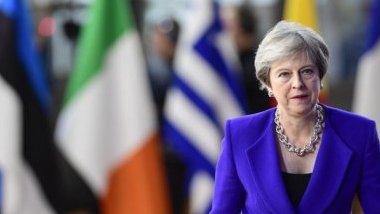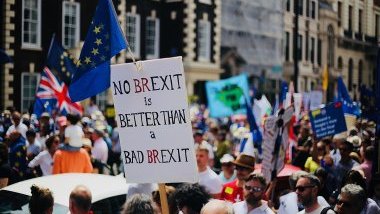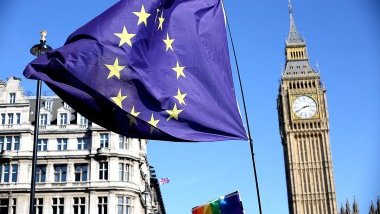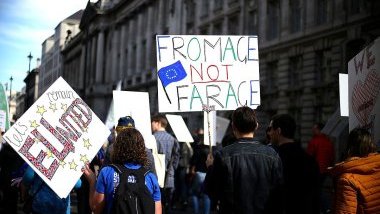Since the referendum which took place on 23 June 2016, Brexit has been an object of intense speculation. Many major issues, from the Irish border to the single market, and from the rights of EU citizens to the divorce bill, have been debated and negotiated between the United Kingdom and the European Union, leaving much uncertainty in the air over whether the UK will opt for a Hard or Soft Brexit.
So, what can we take away from this draft agreement? We now know that EU law will continue to apply to the UK and its citizens during the transition period, and that at the end of it, significant changes will take place. There is still very little information about the nature of said changes, the majority of which will be defined in another agreement, the one on the future relationship between the EU and the UK. The 585-page document solely concerns the conditions of the withdrawal of the UK from the EU and does not define the future relationship. This agreement will come into effect on 30 March 2019 and will cease to apply at the end of the two-year transition period. The rest remains to be negotiated.
Does the agreement guarantee UK and EU citizens’ rights?
This question has raised many concerns since the very day of the referendum. Will EU citizens who reside in the UK, and UK citizens who live in the EU lose their right of residence? The answer is no, they will not be forced to relocate as a result of Brexit. If a European or British citizen has obtained the right to permanent residence, they will keep this right after the end of the transition period. With regard to workers’ rights and social security, citizens will continue to have access to healthcare and pensions as well as retaining their employment status, including self-employment. At the end of the transition period, however, they will have to comply with the requirements of the country of residence; thus, their situation may change.
The free movement of people will also continue during the transition period. This means that UK and EU citizens will have the right to enter and leave the member state in which they reside without having to apply for a visa or equivalent document. They will also be able to continue to travel using only their identity card or passport. Nevertheless, five years after the end of the transition period, EU member states and the United Kingdom reserve the right to no longer allow British and EU citizens respectively to travel with only their identity documents.
However, it should be noted that, at the end of the transition period, British citizens will in fact lose all rights associated with EU citizenship (even if they continue to reside in the EU), since their country will no longer be an EU member. EU citizenship is linked to citizenship of member states, therefore only the citizens of a member state can obtain EU citizenship and the rights which are associated with it. For example, a British national living in France will no longer be able to turn out to vote in municipal elections, unless the conditions of permanent residence in France stipulate otherwise.
Freedom of movement; business as usual…
The free movement of goods will continue during the transition period, meaning that any products legally placed on the European or British market can continue to flow between the two markets without constraint. The current single market rules will continue to apply, including rules on sales terms, intellectual property rights, customs procedures, taxes and customs duties. However, the issue of the free movement of services has not been addressed in the withdrawal agreement. This means that there is currently no specific plan concerning the financial sector and the City of London. Therefore, one can believe that the rules that are currently in place will continue to apply until the end of the transition period.
Ireland: the status quo until 2020
A protocol concerning the Irish border question was annexed to the withdrawal agreement. The protocol commits the United Kingdom and the European Union to reach an agreement on the border between Northern Ireland and the Republic of Ireland before the end of the transition period. If no solution is found in order to avoid the reestablishment of a hard border in Ireland, the measures outlined in the protocol will come into force. This set of measures has been previously referred to as the “backstop” or “safety net” and will be applied until another solution is found.
The protocol concerns itself with ensuring compliance with the principles of the Good Friday Agreement in order to ensure peace and stability on the island of Ireland. In order to resolve the issue of tariffs between the EU and the UK, the protocol ensures that the UK remains in the customs union, thus meaning that the UK will have to comply with its conditions. Furthermore, the protocol provides for the regulatory alignment of Northern Ireland with the single market. This customs arrangement has been strongly criticised by the leader of the SNP, Nicola Sturgeon, on the basis that the agreement would unfairly benefit Northern Ireland and would have a significant negative impact on investment and employment in Scotland. This regulatory alignment of Northern Ireland with the single market will introduce customs checks between Northern Ireland and the other three nations of the United Kingdom, a measure also criticised by the DUP.
The Irish Taoiseach (Prime Minister) Leo Varadkar believes that the draft agreement meets Ireland’s objectives, while hoping that a lasting agreement will be found in order to avoid the reestablishment of a hard border on the island.
What changes will the UK see in 2021?
If this agreement comes into force on 30 March 2019, the UK will enter an EU withdrawal transition period, which will be effective until 31 December 2020. This transition period may be extended upon request by the EU or the UK, as long as the extension is decided before 1 July 2020.
During this period, what will be the UK’s status in relation to, and within the EU? According to the withdrawal agreement, the UK Parliament will no longer be referred to as a “national parliament” as designated by the European treaties and will no longer exercise the duties and obligations associated with that status, just as it will no longer enjoy the associated rights. The UK will be deprived of the institutional rights belonging to EU member states; it will no longer have the right to submit proposals, initiatives, or send requests to European institutions. Regarding the many experts and UK representatives present in European institutions, they will only be able to attend meetings with special authorisation, such as when the meeting concerns the application of the withdrawal agreement or application of EU law in the UK. Equally, they will lose their right to vote.
However, the UK will not have its hands completely tied; it will have the right to negotiate, sign and ratify international agreements in areas where the EU has sole jurisdiction, such as trade policy, fisheries policy, monetary policy, competition, etc. On the other hand, these agreements cannot enter into force or be applied during the transitional period, as they will not be allowed to contradict EU law. The UK will also be excluded from all Enhanced Cooperation Initiatives created or enacted after 31 March 2019.
However, the country will have to abide by the multiannual financial framework, which runs until the end of 2020, by paying its share in the EU budget, and participate in its implementation like any other member state.
Finally, from 2021 onwards, the UK will be considered a third country with regard to the implementation of EU programmes and activities.
The UK will remain subject to the jurisdiction of the European Court of Justice
Until the end of the transition period, the UK will be subject to the jurisdiction of the ECJ and will consequently have to enforce its rulings. British judges may continue to request a preliminary ruling; in other words, they can refer to the ECJ to clarify the interpretation or application of EU law until the end of the transition period.
Despite being hidden away 140 pages deep into the agreement, Article 87 has not gone unnoticed. According to this article, if the European Commission finds that, at any time before the end of the transition period, the UK has not respected its European treaty obligations or the withdrawal agreement, the Commission can make an appeal before the ECJ up to four years after the end of the transition period. The decision reached by the Court of Justice will be binding.
All eyes on Westminster
The withdrawal agreement as it stands must be approved by the UK Parliament, where Theresa May only holds a small majority. There are two possible scenarios: if a majority of British MPs vote in favour of the agreement, it would come into effect on 30 March 2019, triggering the transition period. On the other hand, if Parliament votes against the agreement (as seems likely after the crushing criticism Theresa May received from MPs on Thursday, and the resignation of Brexit Secretary Dominic Raab), the situation could very quickly descend into chaos.
As the March deadline approaches, time for negotiating a new agreement will become an ever-greater luxury, while the likelihood of a General Election or even a second referendum, will increase. Theresa May must now attempt to convince her party, the DUP and MPs on the opposite bench to back her deal before the crucial vote next month – in other words, she has the hardest job in the UK.










Follow the comments: |
|
